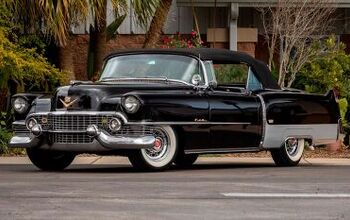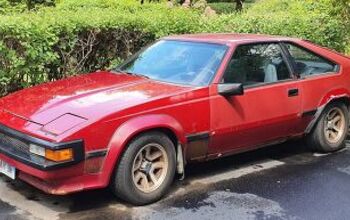Consumers Take a Bath on Rapidly Depreciating Trade-ins

The tsunami of pre-owned vehicles flooding dealer lots is great news for those seeking an affordable, low-wear used car, but the previous owners are taking a hit.
More than ever before, owners returning their vehicle for a trade-in are discovering their old car’s value sank faster than their ability to pay it off. New car buyers, take warning.
A Detroit Free Press report, citing research from Edmunds, claims the number of owners now “underwater” has reached a record high. As of the second quarter of this year, 32 percent of vehicles returned for trade-in are worth less than the remaining balance of the owner’s loan.
The difference is then tacked on to the shiny, alluring new car that owner had his or her eye on. Blame higher transaction prices and long-term loans with tiny monthly payments. Blame the rise in popularity of leasing, too.
According to Experian Automotive, the average car loan covers a term of 68 months, rising to an average of 72 months for subprime borrowers. Rising transaction prices has boosted an average loan by 4.8 percent in the past year, hitting $29,880 at the end of June. However, retained value isn’t keeping up with soaring sticker prices.
The percentage of consumers being soaked on trade-ins tops the previous high of 29.2 percent in 2006, and small cars seem to be the worst offenders. Reduced consumer demand for these vehicles, coupled with rising pre-owned inventories spawned (in part) by a growing crop of leasees, has sent used car values south. Dealers aren’t paying as much for them at auction.
“It’s problematic for the consumer because there’s no foolproof way to eliminate his financial exposure,” Greg McBride, chief analyst at Bankrate.com, told the Detroit Free Press. “If the car gets stolen, is totaled or you get new car envy while you’re upside down then it’s a big problem.”
[Image: Ford Motor Company]

More by Steph Willems
Latest Car Reviews
Read moreLatest Product Reviews
Read moreRecent Comments
- MaintenanceCosts What is the actual out-the-door price? Is it lower or higher than that of a G580?
- ToolGuy Supercharger > Turbocharger. (Who said this? Me, because it is the Truth.)I have been thinking of obtaining a newer truck to save on fuel expenses, so this one might be perfect.
- Zerofoo Calling Fisker a "small automaker" is a stretch. Fisker designed the car - Magna actually builds the thing.It would be more accurate to call Fisker a design house.
- ToolGuy Real estate, like cars: One of the keys (and fairly easy to do) is to know which purchase NOT to make. Let's see: 0.43 acre lot within shouting distance of $3-4 million homes. You paid $21.8M in 2021, but want me to pay $35M now? No, thank you. (The buyer who got it for $8.5M in 2020, different story, maybe possibly.) [Property taxes plus insurance equals $35K per month? I'm out right there lol.] Point being, you can do better for that money. (At least the schools are good? Nope lol.)If I bought a car company, I would want to buy Honda. Because other automakers have to get up and go to work to make things happen, but Honda can just nap away because they have the Power of Dreams working for them. They can just rest easy and coast to greatness. Shhhh don't wake them. Also don't alert their customers lol.
- Kwik_Shift_Pro4X Much nicer vehicles to choose from for those coins.


































Comments
Join the conversation
In my experience, one good reason to buy new is that you know where the car has been. My experience has been that used cars can save a lot in depreciation, but they are always more troublesome (after warranty expires) Over 40 years, no one in my immediate family has ever bought a new car that we thought was a lemon (knock on wood!) During that time, bought two used cars (an 89 Prelude in 92, and a 91 Grand Am in 95) that proved to be "lemons", and I've generally found that used cars tend to need more repairs, and more expensive repairs than new cars. Bought two used cars (75 Nova in 77, 91 BMW 3 in 93) that proved to be excellent cars. Bought a couple used cars that weren't lemons, but were more troublesome than cars bought new. Perhaps it's because we take care of our cars that we've been lucky--the new cars have been GM (7 or 8) and Ford (4) , 1 VW, no new Asian (unless 2 Ford Probes counts as Mazdas). So, based on what I read, our cars should be less reliable than 'average'. So, ideally, find a car you like and can see keeping, and buy new, IMO
Good points TomLU86. I have had few problems with new cars I have bought over the years, but I have had good luck with a 73 Chevelle bought in 75 and a 85 Mitsubishi Mighty Max with only 30k miles bought in 87 for $3,500 which I kept for 14 years. I usually keep my vehicles for an average of 12 years but I have a 99 S-10 bought new which is coming up on 18 years with the only major items being a new clutch, new brakes, tune up, new starter, new alternator, new ac compressor, and 4 sets of replacement tires which is still cheaper than the depreciation or being underwater on a new vehicle. The S-10 has a good body and runs like it has many more years left on it. I bought a new truck in 08 and was only offered 3k as a trade-in for my 99 S-10 which at the time had 82k miles with new tires and all maintenance kept up and records of all maintenance done on it. I have not really spent that much in over 8 years on it and it is worth its value in just the utility it has provided me. If I scrapped it today I would still get more from its use than I ever paid for it including maintenance, repair, and insurance costs. It still has its original paint which looks new and the interior has very little wear. I really could care less what others think of it, but most people think it is newer than it actual is.